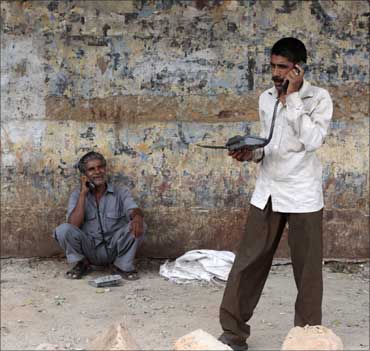
The bidding frenzy for third generation spectrum came to an end on Wednesday with leading mobile operators Bharti Airtel, Reliance Communications and Aircel winning licences for 13 circles each.
This was the 34th day of the auction and it saw the price of a pan-India, or nationwide, licence touching Rs 16,828 crore (Rs 168.28 billion), nearly five times its base price. No single operator could garner enough cash to win bids for all the 22 circles that went under the hammer.
Bharti bid the highest, Rs 12,295 crore (Rs 122.95 billion), for 13 circles.
But, within hours of the close, it attacked the entire process, saying prices had been pushed 'beyond reasonable levels'. The company said in a statement: "The auction format and the severe spectrum shortage, along with ensuing policy uncertainty, drove the prices beyond reasonable levels. As a result, we could not achieve our objective of pan-Indian 3G footprint."
The government, however, emerged as the biggest winner. The sale of wireless airwaves would make it richer by at least Rs 67,719 crore (Rs 677.19 billion), the double of what it had targeted in the Union Budget this year and about one per cent of the country's gross domestic product.
The exchequer is expected to gain more, as the auction of broadband wireless access spectrum (BWA) is to begin in two days. Experts said they expect a similar frenzy at the bidding for two BWA slots on offer in each circle. The base price for a pan-India slot is Rs 1,750 crore (Rs 17.5 billion) and there are 11 players in the field.
...
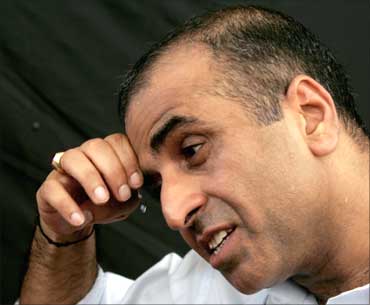
The proceeds from the sale of 3G and BWA spectrum will together help the government plug its fiscal deficit, projected at 5.5 per cent of GDP in the Budget. The winning operators said if the government allots them spectrum as promised, by September 1, they will be able to roll out 3G services in four to six months.
Bharti Airtel, Reliance Communications and Aircel emerged as the big boys with each netting 13 circles in its kitty, including the most lucrative Delhi and Mumbai circles.
Idea Cellular followed with 11 circles, Vodafone Essar and Tata Teleservices got nine circles each, and Stel secured three circles. Videocon and Etilasat DB failed to win a single circle.
While Vodafone-Essar will pay Rs 11,617 crore (Rs 116.17 billion) for nine circles, Reliance Communications will pay Rs 8,585 crore (Rs 85.85 billion).
Bharti Airtel, Reliance Communications and Aircel will pay Rs 3,316 crore (Rs 33.16 billion) each for Delhi, the highest price in all the circles and 10 times its reserve price of Rs 320 crore (Rs 3.2 billion). The trio will also fork out Rs 3,247 crore (Rs 32.47 billion) each for Mumbai, again 10 times the base price.
Interestingly, the two metros of Delhi and Mumbai constitute over 39 per cent of the total value of a pan-India licence, which shows how bitter the competition was for this market. Not without reason, as operators expect about 50 per cent of 3G revenues across the country in the initial stage to come from these two cities.
"We are expecting at least 25 per cent of the post-paid customers to shift to us immediately after we offer service," said one of the bidders who won both the circles.
Looking at it from another angle, 70 per cent of the revenue for spectrum will come from only six circles, while locations such as West Bengal, Himachal Pradesh, Assam and Jammu and Kashmir saw licences being awarded at virtually the base price.
The surprise package was Bihar where the bids closed at Rs 203.46 crore (Rs 2.03 billion), seven times its base price.
...

"Vodafone-Essar has secured a critical strategic footprint across the country, particularly in the markets where we expect the main demand for 3G services to be in the next few years," said CEO and managing director Marten Pieters.
"We are excited to be able to offer 3G services to our customers and aim to launch the services before the end of the year. We expect a strong uptake for 3G in these markets, particularly among the higher value customers, which is a growing segment owing to rising affluence and increasing urban population. We also note with interest that a significant proportion of our customer base in these markets already has a 3G enabled device."
RCom in a statement said: "The company has met all key objectives to win most attractive circles at conservative spend - circles won optimise immediate potential for 3G services as well as long-term growth potential and also addresses future spectrum requirements in highly dense Metro cities."
A Tata Teleservices spokesperson said: "We have covered the entire geography of prosperous India on the western side, while there is no entanglement with Category 'C' circles.
Therefore, this has proven to be a most capex-optimized bidding for us. TTSL did pursue the major metros in the country, but decided to drop out of the bidding when the sheer outlay made these a winner's curse. TTSL management is heartened by the outcome of the bidding process and now hopes that the rules of the auction will not be changed mid-way."
However, experts said the 3G auctions will put a major burden on telcos which have to finance the spectrum payments as well as finance their roll out. Analysts expect that the seven telcos will have to raise over Rs 50,000 crore (Rs 500 billion) though a combination of international as well as domestic borrowings.
...
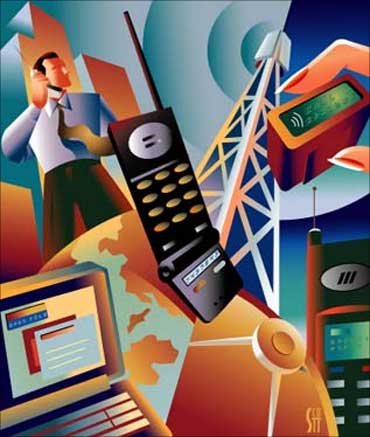
It will certainly impact both their bottomlines as well as their margins especially at a time when competition and lower tariffs are making a dent on their balance sheets.
Telcos and analysts estimate that the industry will have to bear an interest burden of anything between Rs 3,000 crore to Rs 3,500 crore (Rs 35 billion) annually to finance the 3G dream.
The burden will also increase if the recent Telecom Regulatory Authority of India recommendations to link the price of excess 2G spectrum with the 3G rate are accepted. It is estimated that the additional burden could be to the tune of over Rs 17,000 crore (Rs 170 billion) for the GSM operators.
Globally, governments have been able to raise huge sums of money from 3G auctions, but companies have been in serious trouble for many years trying to justify such high prices, especially without the market growing commensurately.
In 2000, UK raised more than $35 billion from spectrum auction, while Germany collected about $67 billion from its UMTS licence auctions. In 2008, US raised $18 billion from spectrum auction.
Experts, however, said the lack of a pan-India player should not be a dampener to consumers.
"No pan-India player means that people will rely on roaming agreements to have a seamless rollout across the country," said Naresh Singh, Principal Analyst, Gartner.
"They will lookout for partners wherever they dont have licences."
However, he added, the challenge would be financial closure of new investments which have to be done within 10 days.
...
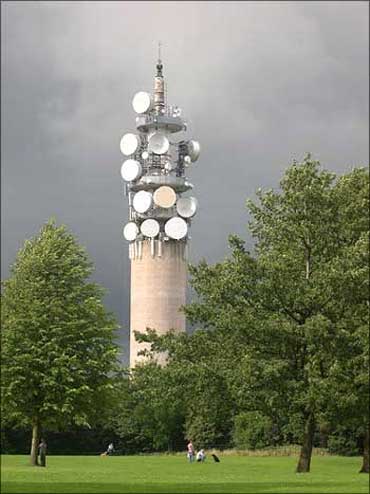
Everyone agrees that the price will adversely impact bottomlines especially as the auction money has to be paid in 20 days.
"The fact that companies like Bharti have been the bidder for 13 circles is a surprise. Profitabilty on 3G basis will be the question.
Breakeven will be in the long term and there will be pressure on these companies to be profitable and afloat for the next few years. Across the industry, 3G auction breakeven should take at least five years," said Sandeep Ladda, Telecom Head, PWC.
But Ladda said he expects 3G rollout should be aggressive in 25 to 50 cities because mobile number portability is round the corner.
And it is important for companies to rollout 3G quickly in the interest of retaining the top 10 per cent of customers. "This top 10 per cent will give the revenue and will probably be those who will move into the 3G service area," he added.
Echoed Harit Shah of Karvy Broking: "The price is expensive, that is why operators have decided to bid for selective circles were they have a foothold rather than go pan India. Of course the bids would lead to high interest and amortisation costs, which will have an impact on their bottomlines."
...
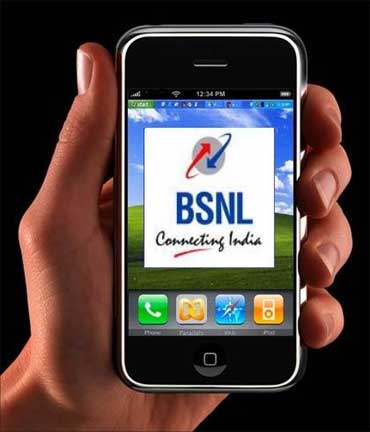
BSNL, MTNL to match winning bid
State-run telecom majors Bharat Sanchar Nigam Ltd and Mahanagar Telephone Nigam Ltd are willing to pay over Rs 10,000 crore (Rs 100 billion) and Rs 6,524 crore (Rs 65.24 billion), respectively, to the government for the 3G spectrum.
Both BSNL and MTNL were awarded 3G spectrum last year ahead of auction for private players. However, under the rules, both the PSUs have to match the winning bid of the 3G auction.
"We have enough cash reserves to pay the 3G amount ...but if the government decides to give a waiver, then we will follow the government rule," said BSNL chairman and managing director Kuldeep Goel.
An MTNL official also said the company was willing to pay the amount as discovered by the 3G auction on Wednesday. "We are a debt-free and cash-rich company. We will abide by the government rules," an official said.
The value of a pan-India 3G slot stood at Rs 16,828 crore. MTNL would pay the price for Delhi and Mumbai circles at Rs 3316.93 crore (Rs 33.17 billion) and Rs 3247.07 crore (Rs 32.47 billion), respectively. BSNL would pay over Rs 10,000 crore (Rs 100 billion) for rest of the circles.
...

Telecom firms to raise funds at over 10.5%
Within hours of finalisation of the 3G spectrum bids, telecom companies are in talks with banks to access funds for up to a year.
According to preliminary indications, banks have offered to extend short-term loans - which will be substituted by long-term loans, domestic and foreign - at over 10.5 per cent a year. Even at these rates, the loans would be below the prevailing prime lending rate for all Indian banks.
The rates will, however, vary for companies and be linked to their credit rating and risk appetite of the bank, lenders said. Therefore, banks that already have high debt exposure to a company may have little headroom to provide further funding.
Based on the rating, Bharti Airtel, for instance, will be able to access funds at a lower rate than, say, STel, a new player in the telecom arena.
Lenders led by State Bank of India and IDBI Bank have already committed over Rs 40,000 crore (Rs 400 billion) to telecom companies to meet their funding requirements towards 3G spectrum fee, due to be paid over the next two weeks.
While the bids have gone beyond what was expected when the auction process started 34 days ago, bankers said the companies will be able to access funds through other windows available to them.
Subsequently, these loans would be substituted by lower-cost external loans.
Apart from raising funds to pay spectrum charges, the telecom companies will also need money to roll out the required infrastructure. Bankers said a large part of the funding for this will be made available by vendors and external funding agencies.
...
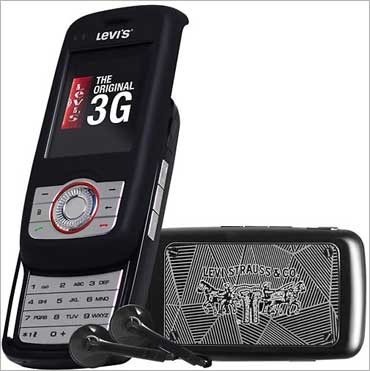
Most of the funding would be for the short term. But, this money would not come cheap, despite the prevailing low interest rates in the market, marked by abundant liquidity.
For the moment banks are focusing on the spectrum charges. "They have already tied up funding. Given the big-ticket loans, it would be in nature of multiple banking or consortium funding," a Punjab National Bank executive said.
A senior IDBI Bank official said: "The duration of loans to telecom operators to pay fees may be of short duration but pricing will definitely happen at commercial rates (linked with prime lending rate). It means credit will not come at the low rates prevailing in the money market, where liquidity is abundant."
Though the demand for credit has picked up, banks still have surplus cash at their disposal. Today, they parked Rs 43,000 crore (Rs 430 billion) through the Reserve Bank of India's reverse repo window. In addition, they have parked over Rs 1,06,000 crore (Rs 1,060 billion) in mutual fund schemes, due to want of lending avenues.
"Luckily for the markets, the bidding process got over nearly a month before the first instalment of advance tax is to be paid. So, the pressure on the money markets will be less," said the treasury head of a large public sector bank.
The yield on 10-year government securities fell today after news of the close of 3G auction was announced, as the market drew comfort from the fact that the government may lower its planned borrowing of Rs 4,57,143 crore (Rs 45.71 billion) due to the windfall.
The Centre had budgeted to mop up around Rs 35,000 crore (Rs 350 billion) from the auction. The yield on the benchmark government paper (7.80 per cent maturing in 2020) ended at 7.44 per cent, the lowest in five-and-a-half months, as against Wednesday's close of 7.50 per cent.